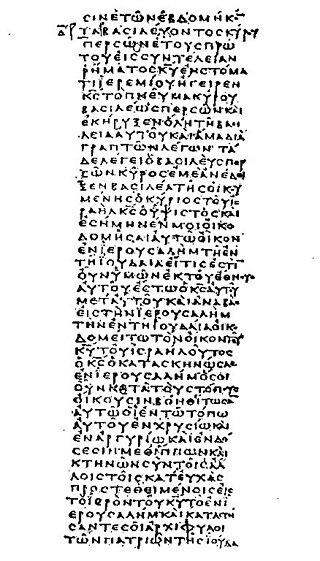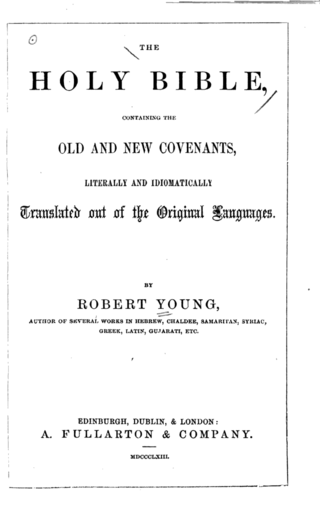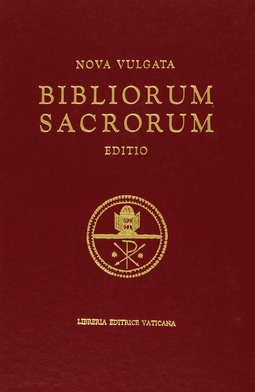
The King James Version (KJV), also the King James Bible (KJB) and the Authorized Version (AV), is an Early Modern English translation of the Christian Bible for the Church of England, which was commissioned in 1604 and published in 1611, by sponsorship of King James VI and I. The 80 books of the King James Version include 39 books of the Old Testament, 14 books of Apocrypha, and the 27 books of the New Testament.

The Septuagint, sometimes referred to as the Greek Old Testament or The Translation of the Seventy, and often abbreviated as LXX, is the earliest extant Greek translation of the Hebrew Bible from the original Biblical Hebrew. The full Greek title derives from the story recorded in the Letter of Aristeas to Philocrates that "the laws of the Jews" were translated into the Greek language at the request of Ptolemy II Philadelphus by seventy-two Hebrew translators—six from each of the Twelve Tribes of Israel.

The Vulgate is a late-4th-century Latin translation of the Bible. It is largely the work of St. Jerome who, in 382, had been commissioned by Pope Damasus I to revise the Vetus Latina Gospels used by the Roman Church. Later, of his own initiative, Jerome extended this work of revision and translation to include most of the books of the Bible.

The Samaritan Pentateuch, also called the Samaritan Torah, is the sacred scripture of the Samaritans. Written in the Samaritan script, it dates back to one of the ancient versions of the Torah that existed during the Second Temple period. It constitutes the entire biblical canon in Samaritanism.

The New World Translation of the Holy Scriptures is a translation of the Bible published by the Watch Tower Bible and Tract Society; it is used and distributed by Jehovah's Witnesses. The New Testament portion was released first, in 1950, as the New World Translation of the Christian Greek Scriptures, with the complete New World Translation of the Bible released in 1961.

The Bible has been translated into many languages from the biblical languages of Hebrew, Aramaic, and Greek. As of November 2024 the whole Bible has been translated into 756 languages, the New Testament has been translated into an additional 1,726 languages, and smaller portions of the Bible have been translated into 1,274 other languages according to Wycliffe Global Alliance. Thus, at least some portions of the Bible have been translated into 3,756 languages.
More than 100 complete translations into English languages have been produced. Translations of Biblical books, especially passages read in the Liturgy can be traced back to the late 7th century, including translations into Old and Middle English.

The Peshitta is the standard version of the Bible for churches in the Syriac tradition.
Greek Bible may refer to:

Young's Literal Translation (YLT) is a translation of the Bible into English, published in 1862. The translation was made by Robert Young, compiler of Young's Analytical Concordance to the Bible and Concise Critical Comments on the New Testament. Young used the Textus Receptus (TR) and the Masoretic Text (MT) as the basis for his translation. He wrote in the preface to the first edition, "It has been no part of the Translator's plan to attempt to form a New Hebrew or Greek Text—he has therefore somewhat rigidly adhered to the received ones." Young produced a "Revised Version" of his translation in 1887, but he stuck with the Received Text. He wrote in the preface to the Revised Edition, "The Greek Text followed is that generally recognized as the 'Received Text,' not because it is thought perfect, but because the department of Translation is quite distinct from that of textual criticism, and few are qualified for both. If the original text be altered by a translator, the reader is left in uncertainty whether the translation given is to be considered as that of the old or of the new reading." A new Revised Edition was released ten years after Robert Young's death on October 14, 1888. The 1898 version was based on the TR, easily confirmed by the word "bathe" in Revelation 1:5 and the word "again" in Revelation 20:5. The "Publishers' Note to the Third Edition" explains, "The work has been subjected to a fresh revision, making no alteration on the principles on which the Translation proceeds, but endeavouring to make it as nearly perfect in point of accuracy on its present lines as possible." A major revision of Young's Literal Translation in contemporary English, called the Literal Standard Version, was released in 2020.

The Tz'enah Ur'enah, also spelt Tsene-rene and Tseno Ureno, sometimes called the Women's Bible, is a Yiddish-language prose work whose structure parallels the weekly Torah portions and Haftarahs used in Jewish prayer services. The book was written by Jacob ben Isaac Ashkenazi (1550–1625) of Janów Lubelski, and mixes Biblical passages with teachings from Judaism's Oral Torah such as the Talmud's Aggadah and Midrash, which are sometimes called "parables, allegories, short stories, anecdotes, legends, and admonitions" by secular writers.

The Nova Vulgata, also called the Neo-Vulgate, is the Catholic Church's official Latin translation of the original-language texts of the Catholic canon of the Bible published by the Holy See. It was completed in 1979, and was promulgated the same year by John Paul II in Scripturarum thesaurus. A second, revised edition was published in 1986. It is the official Latin text of the Bible of the Catholic Church. The Nova Vulgata is also called the New Latin Vulgate or the New Vulgate.

The Biblia Hebraica Stuttgartensia, abbreviated as BHS or rarely BH4, is an edition of the Masoretic Text of the Hebrew Bible as preserved in the Leningrad Codex, and supplemented by masoretic and text-critical notes. It is the fourth edition in the Biblia Hebraica series started by Rudolf Kittel and is published by the Deutsche Bibelgesellschaft (German Bible Society) in Stuttgart.

Christian David Ginsburg was a Polish-born British Bible scholar and a student of the Masoretic tradition in Judaism. He was born to a Jewish family in Warsaw but converted to Christianity at the age of 15.
Hebrew Bible English translations are English translations of the Hebrew Bible (Tanakh) according to the Masoretic Text, in the traditional division and order of Torah, Nevi'im, and Ketuvim. Most Jewish translations appear in bilingual editions (Hebrew–English).

Joseph Bryant Rotherham's Emphasized Bible is a translation of the Bible which uses various methods, such as "emphatic idiom" and special diacritical marks, to bring out nuances of the underlying Greek, Hebrew, and Aramaic texts. Rotherham was a Bible scholar and minister of the Churches of Christ, who described his goal as "placing the reader of the present time in as good a position as that occupied by the reader of the first century for understanding the Apostolic Writings".
Word of God or God's Word may refer to:
Bible translations into Hebrew primarily refers to translations of the New Testament of the Christian Bible into the Hebrew language, from the original Koine Greek or an intermediate translation. There is less need to translate the Jewish Tanakh from the Original Biblical Hebrew, because it is closely intelligible to Modern Hebrew speakers. There are more translations of the small number of Tanakhas passages preserved in the more distantly related biblical Aramaic language. There are also Hebrew translations of Biblical apocrypha.

The Christian Standard Bible (CSB) is a translation of the Bible in contemporary English. Published by Holman Bible Publishers in 2017 as the successor to the Holman Christian Standard Bible (HCSB), the CSB "incorporates advances in biblical scholarship and input from Bible scholars, pastors, and readers to sharpen both accuracy and readability." The CSB relies on recently published critical editions of the original Hebrew, Aramaic, and Greek texts.

Jeremiah 33 is the thirty-third chapter of the Book of Jeremiah in the Hebrew Bible or the Old Testament of the Christian Bible. It is numbered as Jeremiah 40 in the Septuagint. This book contains prophecies attributed to the prophet Jeremiah, and is one of the Books of the Prophets.














